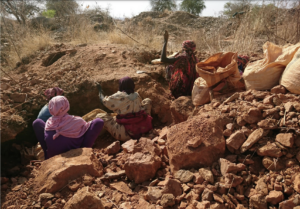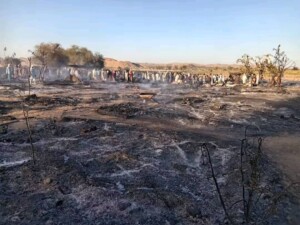North Darfur Wali: ‘Climate change droughts feeding conflicts over water’
The Acting Wali (Governor) of North Darfur, Hafez Bakheet, has warned of the negative effects of climate changes that have occurred in the states of Darfur in recent decades, especially of droughts and the outbreak of conflict over water resources. A workshop was held in South Darfur on the position of women in the face of climate change. The Ministry of Water and Irrigation warned that Khartoum might become uninhabitable due to the unsustainable use of water resources.
 A woman draws water from a 95-metre well in Malha, North Darfur (Mohamad Almahady / Unamid)
A woman draws water from a 95-metre well in Malha, North Darfur (Mohamad Almahady / Unamid)
The Acting Wali (Governor) of North Darfur, Hafez Bakheet, has warned of the negative effects of climate changes that have occurred in the states of Darfur in recent decades, especially of droughts and the outbreak of conflict over water resources. A workshop was held in South Darfur on the position of women in the face of climate change. The Ministry of Water and Irrigation warned that Khartoum might become uninhabitable due to the unsustainable use of water resources.
He said that one of the most prominent of these climatic changes is the lack of rainfall in Darfur, which led to a significant decline in surface water reserves and the outbreak of ongoing conflicts over water resources.
The Wali spoke at a workshop in El Fasher to review the outputs of a climate change adaptation project for the states of Darfur, which coincided with World Water Day.
He added that climate change has become a reality that requires to be dealt with seriously and called on the General Administration of Groundwater and Valleys to take advantage of the increased water flow in the valleys during the autumn season by establishing a large number of dams for surface water storage in Darfur, the north in particular, and for feeding groundwater basins.
Women's workshop
In South Darfur, a workshop was held on 'women’s resilience in the face of climate change' at the Centre for Peace and Development Studies at Nyala University, with a special focus on the position of women in relation to conflicts, peace, and security.
The workshop, which lasted for three days, was organised by the Organisation for Peace and Popular Development in cooperation with the United Nations Women’s Authority in relation to the celebration of International Women’s Day.
The workshop set a strategy for the position of women in light of climate change.
The Director of the Centre for Peace Research and Studies at Nyala University, Dr Saad Eddin Hassan, announced the centre’s readiness to provide feasibility studies to serve women in various fields to help them face life challenges and improve their living and economic conditions.
Danger in Khartoum
In addition, the Ministry of Irrigation warned that the unsustainable use of groundwater, including mixing drinking water with sewage is making Sudan's capital Khartoum uninhabitable.
The Ministry of Irrigation explained Khartoum will become uninhabitable in the coming decades unless major changes are made to preserve the groundwater reserves.
They warned about the increased and unguided extraction of water in a way that is inconsistent with the capacity of the water basins and the danger of “pollution of drinking water and its mixing with sewage due to unguided drilling of wells".
The ministry's statement said that improving the efficiency of using groundwater wells requires protecting the sources from depletion and pollution. "This is a matter that requires direct state intervention", the ministry said.
The Ministry of Irrigation has demanded the enactment of legislation to prevent violating water sources, especially groundwater.











 and then
and then